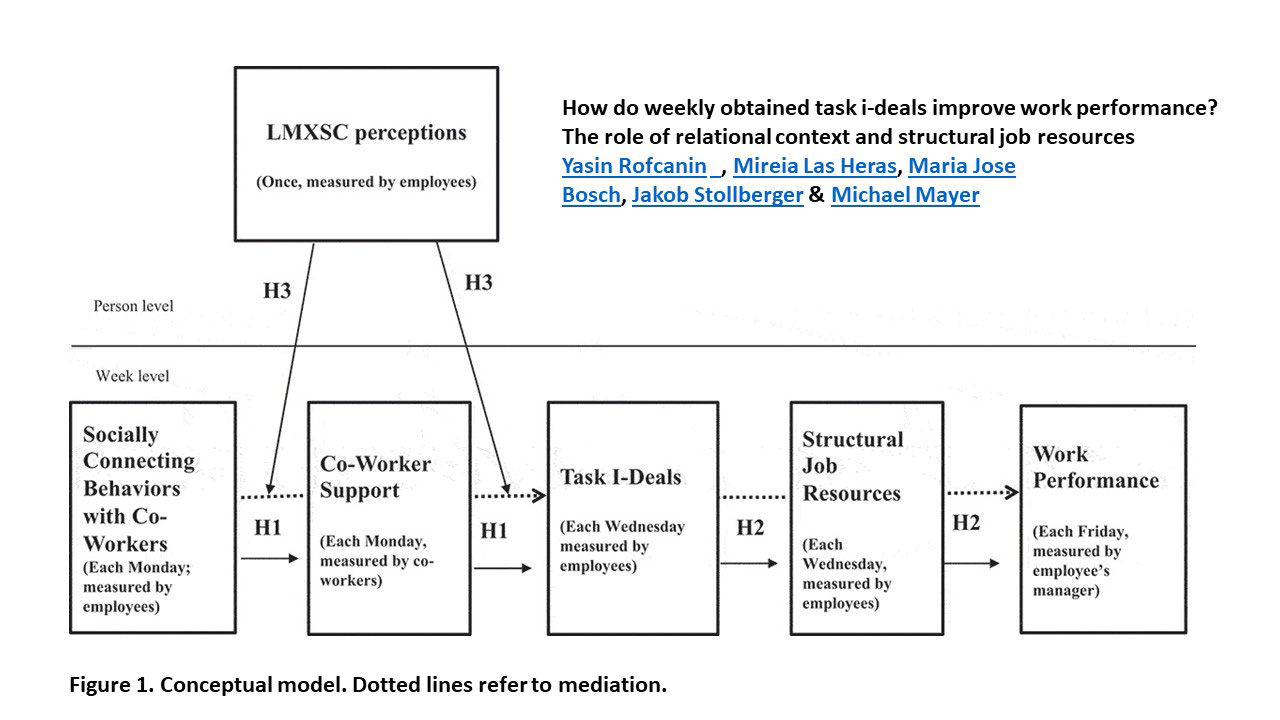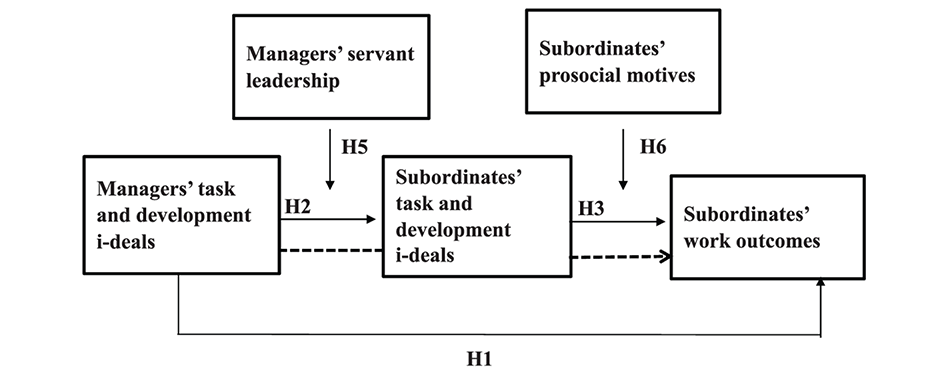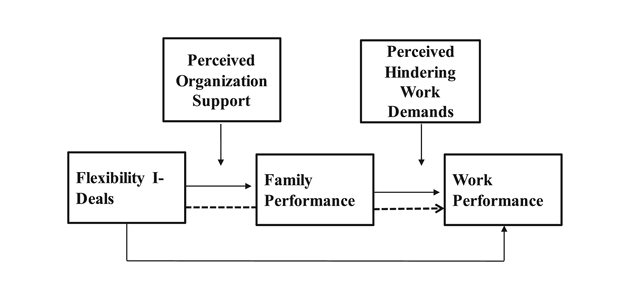Idiosyncratic Deals (I-Deals)
Doesn’t it make sense to negotiate deals that benefit the employee and the organization?
In the context of changing careers and dynamic work settings, differentiating employee treatment has inevitably become an important part of managerial practice. Referred to as personalized work arrangements negotiated between employees and their managers (Rousseau, 2005), idiosyncratic deals (i deals) commonly take the form of task i-deals, providing employees with training, development and career growth opportunities (task i-deals), or flexibility i-deals regarding when and where work is carried out (Rosen et al., 2013).
I-deals are defined as ‘voluntary, personalized agreements of a non-standard nature negotiated between individual employees and their employers regarding terms that benefit each party’ (Rousseau, 2005: 23).
I-deals are marked by three key features: they are negotiated individually, they are intended to be beneficial to everyone, including co-workers and the organization, and they vary in terms of scope (Liao et al., 2016). Such deals may take the form of flexibility i-deals, providing employees with flexibility in location or schedule, financial package i-deals, offering employees individualized compensation and raise in salary or task and work responsibility i-deals (i.e., task i-deals), offering employees training, development or career growth opportunities (Rosen et al., 2013).
The papers in this section explore the antecedents of i-deals (both at the organizational level, as well as at the managerial level), the consequences of i-deals (for the organization as well as for the employee). Some also explore the role of i-deals as mechanism that link individual characteristics of the leaders, with outcomes at the employee level.
Explore the consequences of flexibility i-deals in work and non-work domains of employees.
Abstract
Purpose
The goal of this study is to explore the consequences of flexibility i-deals in work and non-work domains of employees.
Design/methodology/approach
A matched supervisor–subordinate sample context drawn from a security organization in Chile (N = 3,624 subordinates matched with 107 supervisors) was used which is an unrepresented context in research on i-deals.
Findings
Results from multi-level analyses reveal that the interaction of performance motivation of subordinates and flexibility i-deals matters to performance motivation of subordinates. In turn, performance motivation reduces turnover intentions and work–family conflict of subordinates.
Research limitations/implications
The findings from multi-level structural equation modelling supported our hypotheses and offered interesting implications for the i-deals literature and practitioners. Our findings highlight (1) the importance of being performance driven to obtain flexibility i-deals and (2) the enabling role of performance-oriented supervisors.
Practical implications
Flexibility i-deals act as mechanism that translate the impact of performance motivation on key work and non-work outcomes and can be considered as important HR tools for employees and managers.
Originality/value
This research highlights the importance of performance motivation to obtain i-deals and emphasises that the motivation of supervisors is key to enable these deals. Furthermore, the context of this research, which is a security organisation, is important as research to date has been conducted in Western and corporate settings.
Citation
Ererdi, C., Wang, S., Rofcanin, Y. and Las Heras, M. (2022), "Understanding flexibility i-deals: integrating performance motivation in the context of Colombia", Personnel Review, Vol. ahead-of-print No. ahead-of-print. https://doi.org/10.1108/PR-08-2019-0419
How do weekly obtained task i-deals improve work performance? The role of relational context and structural job resources, European Journal of Work and Organizational Psychology, DOI
Abstract
Drawing on theories of perspective‐taking and i‐deals, this study explores the impact of supervisors' own caregiving responsibilities for elders and parental status on subordinates' schedule i‐deals. Moreover, we investigate the extent to which schedule i‐deals mediate the relationship between supervisors' caregiving responsibilities and 2 employee outcomes: satisfaction with work–family balance and turnover intentions. Using a sample of 520 dyads involving 137 supervisors and 520 employees, the results of multilevel analysis show that supervisors' caregiving responsibilities for elders is positively related to schedule i‐deals, but their parental status is not. The findings also show that schedule i‐deals mediate the effect of supervisors' caregiving responsibilities for elders on subordinates' satisfaction with work–family balance and turnover intentions.
Keywords: #Within_person_study #i_deals #co_worker_support #job_resources #work_performance
Citation
Yasin Rofcanin, Mireia Las Heras, Maria Jose Bosch, Jakob Stollberger & Michael Mayer (2020) How do weekly obtained task i-deals improve work performance? The role of relational context and structural job resources, European Journal of Work and Organizational Psychology, DOI
‘Handle with care’: The mediating role of I-deals in the relationship between supervisors’ care-giving responsibilities and employee outcomes
Abstract
Drawing on theories of perspective‐taking and i‐deals, this study explores the impact of supervisors' own caregiving responsibilities for elders and parental status on subordinates' schedule i‐deals. Moreover, we investigate the extent to which schedule i‐deals mediate the relationship between supervisors' caregiving responsibilities and 2 employee outcomes: satisfaction with work–family balance and turnover intentions. Using a sample of 520 dyads involving 137 supervisors and 520 employees, the results of multilevel analysis show that supervisors' caregiving responsibilities for elders is positively related to schedule i‐deals, but their parental status is not. The findings also show that schedule i‐deals mediate the effect of supervisors' caregiving responsibilities for elders on subordinates' satisfaction with work–family balance and turnover intentions.
This research contributes to the i‐deals' literature by focusing on the role of managers' own caregiving responsibilities in facilitating the provision of schedule i‐deals to their subordinates and by exploring the consequences of schedule i‐deals to gain an understanding of the mutually beneficial nature of such deals. From a practical point of view, supervisors and HR departments might utilise schedule i‐deals to drive desirable employee outcomes, in particular their caregiving responsibilities, and to engender a family‐supportive organisational culture.
Keywords:
Citation
Mireia Las Heras; Beatrice I.J.M. Van der Heijden; Jeroen de Jong; Yasin Rofcanin “‘Handle with care’: The mediating role of I-deals in the relationship between supervisors’ care-giving responsibilities and employee outcomes ” Human Resource Management Journal DOI: 10.1111/1748-8583.12160
A trickle-down model of task and development i-deals
Yasin Rofcanin, Mireia Las Heras, P Matthijs Bal, Beatrice IJM Van der Heijden, Didem Taser Erdogan
Abstract
In today’s competitive landscape, employees increasingly negotiate idiosyncratic deals (i-deals), referring to personalized work arrangements that address recipients’ unique work needs and preferences. While i-deals unfold in a dyadic context between subordinates and their managers, the consequences of i-deals concern everyone including co-workers and the organization. Focusing on task and development i-deals, we propose a trickle-down model to explore whether and how organizations benefit from i-deals. First, we argue that managers’ task and development i-deals cascade down to their subordinates, leading them to have similar i-deals with downstream consequences for co-workers and the organization. Furthermore, we propose that effective implementation of task and development i-deals are context-specific: we integrate the role of managers’ servant leadership as a boundary condition to explore the association between managers’ and subordinates’ task and development i-deals. We also integrate subordinates’ prosocial motives to explore the association between subordinates’ task and development i-deals and their work outcomes. We draw on work adjustment, social learning and social information processing theories to study our proposed associations.
The results of a matched employee–manager dataset collected in the Philippines support our hypothesized model. This study contributes to i-deals research by: (1) testing whether and how task and development i-deals can be mutually beneficial for all the involved parties; and (2) revealing how the context, at the individual level, explains how and when task and development i-deals can best be implemented in workplaces. This study highlights that individualization of HR practices need not be a zero-sum game.
Keywords: #IdiosyncraticDeals #TrickleDown #WorkPerformance
Citation
Rofcanin, Y., Las Heras, M., Bal, P. M., Van der Heijden, B. I., & Taser Erdogan, D. (2018). A trickle-down model of task and development i-deals. Human Relations, 71(11), 1508–1534.
How do flexibility i-deals relate to work performance? Exploring the roles of family performance and organizational context.
Nominee of the annual Rosabeth Moss Kanter Award for Excellence in Work-Family Research
Abstract
Drawing on the work–home resources model and conservation of resources theory, in this study, we explore how flexibility idiosyncratic deals (i-deals) relate to employees' work performance through their family performance. In line with the work–home resources model, we introduce 2 contextual conditions to explain when our proposed associations may unfold. One is a facilitator: perceived organizational support; and the other is a stressor: perceived hindering work demands. The results of a matched sample of employees and their supervisors working in 2 companies in El Salvador support our hypotheses. Our findings show that the benefits of flexibility i-deals to the work domain (i.e., work performance) extend only through the family domain (i.e., family performance). Our findings also emphasize that flexibility i-deals do not unfold in a dyadic vacuum: For employees who perceive organizational support to be higher, the association between flexibility i-deals and family performance is stronger, whereas for employees who perceive hindering work demands to be lower, the association between family performance and employee work performance is also stronger.
Keywords: #FamilyPerformance #WorkDemands #i‐deals #POS #WorkPerformance
Citation
Las Heras M, Rofcanin Y, Matthijs Bal P, Stollberger J. How do flexibility i-deals relate to work performance? Exploring the roles of family performance and organizational context. Journal Organizational Behavior. 2017;0:1–15





























